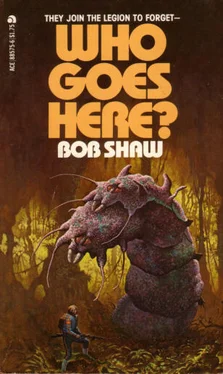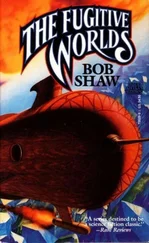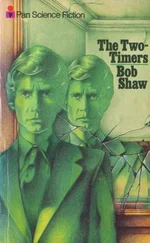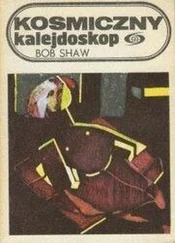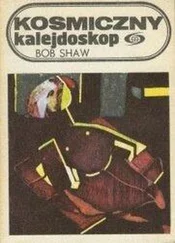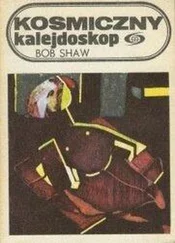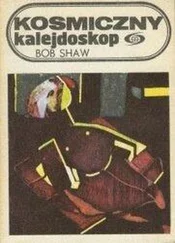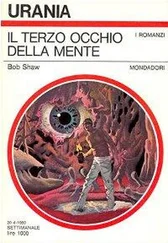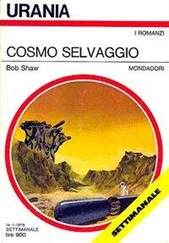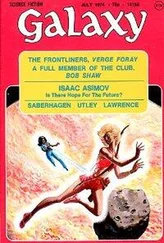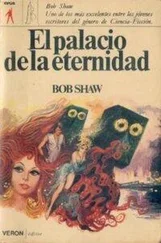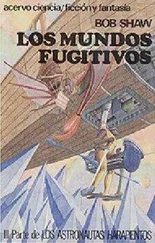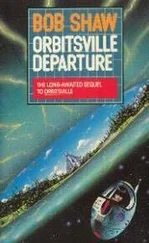Bob Shaw - Who Goes Here?
Здесь есть возможность читать онлайн «Bob Shaw - Who Goes Here?» весь текст электронной книги совершенно бесплатно (целиком полную версию без сокращений). В некоторых случаях можно слушать аудио, скачать через торрент в формате fb2 и присутствует краткое содержание. Год выпуска: 1978, ISBN: 1978, Издательство: Ace Books, Жанр: Юмористическая фантастика, на английском языке. Описание произведения, (предисловие) а так же отзывы посетителей доступны на портале библиотеки ЛибКат.
- Название:Who Goes Here?
- Автор:
- Издательство:Ace Books
- Жанр:
- Год:1978
- ISBN:0-441-88575-6
- Рейтинг книги:4 / 5. Голосов: 1
-
Избранное:Добавить в избранное
- Отзывы:
-
Ваша оценка:
- 80
- 1
- 2
- 3
- 4
- 5
Who Goes Here?: краткое содержание, описание и аннотация
Предлагаем к чтению аннотацию, описание, краткое содержание или предисловие (зависит от того, что написал сам автор книги «Who Goes Here?»). Если вы не нашли необходимую информацию о книге — напишите в комментариях, мы постараемся отыскать её.
Who Goes Here? — читать онлайн бесплатно полную книгу (весь текст) целиком
Ниже представлен текст книги, разбитый по страницам. Система сохранения места последней прочитанной страницы, позволяет с удобством читать онлайн бесплатно книгу «Who Goes Here?», без необходимости каждый раз заново искать на чём Вы остановились. Поставьте закладку, и сможете в любой момент перейти на страницу, на которой закончили чтение.
Интервал:
Закладка:
Peace’s instinctive reaction was to flee—his feet were making preliminary movements of their own accord—but his intellect dictated otherwise. Running would be the surest way of drawing attention to himself, and there was the overriding consideration that he was not guilty of any offence. There was no way of telling if these Oscars were the same pair who had chased him in his subjective yesterday—their smoothly cast features were almost identical—but the point was that this was the ninth of November, and therefore his desertion from the Legion, his abscondence from the Blue Toad, and the embarrassing episode at the movie house all lay a month in the future. Even if the Oscars could read minds, as some people had said, they could not persecute them for crimes they had yet to commit. He took a pack of self-igniting cigarettes from his pocket, sucked one into life and tried to appear relaxed and unconcerned.
The Oscars continued on their course through the departure lounge, the morning light glinting on tapering muscular bodies, their ruby-eyed faces impassive. People moved respectfully out of their way, but otherwise hardly seemed to notice the presence of the statuesque beings.
Wishing that he could be similarly unconcerned, Peace tried to blank out all memory of his misdeeds and discovered that resolving not to think of any particular subject produces an effect opposite to the one intended.
He pursed his lips and began to whistle tunelessly, a trick he felt would make him the image of bored innocence, but had forgotten his lungs were full of cigarette smoke. He emitted a single, hacking cough, loud as the bark of a walrus, which caused some bystanders to start violently and drew glances of sympathy from others.
The Oscars turned their heads towards him, and both came to a halt.
Peace, trying to stare down the inhuman gazes, puffed faster at his cigarette. I’m not guilty, his mind chanted in panic. I haven’t done all those awful things.
The Oscars’ heads rotated slowly until they were looking into each other’s eyes. Their silent communion lasted for several seconds, then both nodded and came striding towards Peace. So determined was he to prove he had nothing to fear that he waited until they were almost upon him before his nerve broke. Ducking to avoid outstretched brazen arms, he bolted for the only open ground available, which happened to be the landing field itself. He reached the customs barrier and, his muscles again supercharged by fear, sprang cleanly over it and headed out into the haphazard alleys formed by the parked spaceships. A clangor of falling metal behind him announced that, characteristically, the Oscars had chosen to run straight through the barrier.
Their footsteps drummed loudly in his wake, growing closer with every microsecond.
Peace cast around wildly for an escape route and saw a dark rectangle which was an open door at one end of a spaceship. He dashed into it, slammed the heavy steel door into place; to his relief, it locked automatically. Grateful for the fortress-like protection of the ship’s armoured shell, he staggered across what appeared to be a control room and dropped into its single cushioned seat. Breathing noisily, struggling to repress the trembling of his limbs, he surveyed his new environment and tried to plan his next move. The attempt at cerebration ended, stillborn, as one of the loudest sounds he had ever heard reverberated through the square room and, in the same instant, a bulge the size of a dinner plate appeared on the door he had just closed.
Peace’s face contorted with shock as he deduced that one of the Oscars had punched the steel slab with his fist— and had almost succeeded in holing it. With fingers crammed into his mouth, he stared in horror at the distorted metal and realized that had the Oscar thought of striking near the lock the door would almost certainly have burst open.
Perhaps, he thought, avidly clutching a thread of hope, they aren’t very intelligent. Perhaps that’s their one weak point, their Achilles’ heel. If so, how can I turn this fact to my advantage? How can I…?
Again his powers of thought were swamped by a cataclysmic sound, a second bulge appeared on the door, and it was born home to Peace that the Oscars simply had no need for brain power. They were invincible as they were. Driven almost beyond reason, he swung round to the sloping control console at which he was seated. A curious ripple passed over his vision, accompanied by a pins-and-needles sensation within his head, and for a fleeting moment he saw the array of instruments and controls through the eyes of another person. He stroked his hand down two rows of toggle switches, hit a large red button, and pulled upwards on the central control stick.
The blank wall in front of him became transparent. There was a glimpse of the spaceport buildings falling away below, a flash of blue sky turning to black—and then he was gazing, transfixed, at the hard, hostile brilliance of the stars.
The speed of the ship was so great that Peace could see a flowing change of parallax in the nearer stars. Entranced by the spectacle, he watched the bright specks swimming by; then it occurred to him that in order to produce such an effect the ship had to be going like a bat out of hell—and he had no idea of where it was headed. He should have been overjoyed at once more being delivered from the hands of the Oscars, who seemed to bear him a grudge, but now there was a new danger of his being lost for ever in the deeps of space. It was beginning to seem that there was no end to the unpleasant surprises fate had in store for him, that no matter how many catastrophes he avoided there would always be more lying in wait…
“That’s it,” Peace said in an aggrieved voice. “What’s the point of struggling? I’m just going to sit here and accept my destiny—and what a strange and lonely destiny it’s going to be!
“On and on I’ll go,” he intoned, warming to the subject, “far beyond the meagre confines of this galaxy and all the galaxies about it. Outstripping the speed of laggard light, on laughter-gilded wings, I’ll suffer a C-change. And what marvellous sights I’ll see before death finally closes my eyes—nebulae writhing in the exquisite torment of creation, the cosmic beacons of supernovae, universes like fireflies tangled in a silver braid…” Pleased with his newfound fatalism, Peace crossed his arms, sat back in the deep chair and made ready for eternity. He remained at one with the cosmos for perhaps ten seconds, and then boredom set in. It was quickly followed by panic. “Bugger the fireflies and silver braid,” he cried, leaping from the chair. “I want to go home.”
He ran to the transparent front wall and hunted all over it, as though having moved two paces closer could help him identify the pinpoint of light which would be Sol. Even in his distraught condition he realized almost at once that the quest was hopeless—there were millions of suns, scattered ahead of the ship in such profusion that it was impossible to impose any kind of order on them. Nothing short of a powerful computer would be able to cope with the astrogation problems involved, he decided, and caught his breath as the pins-and-needles he had experienced earlier returned in force, causing a strange easing sensation within his head.
It was rather as if a tourniquet had been relaxed, except that the renewed flux was far less tangible than blood, consisting as it did of an etheral slurry of associations, ideas and concepts. Am I getting my memory back? he wondered, returning to the spaceship control console. Have I ever flown a ship like this?
He sat down and examined the various panels more carefully, this time beginning to appreciate that there were a number of logical groupings. The rows of switches he had thrown in his first flash of perception had labels which identified them with transceiver warm-up and manual take-off, but there was a separate module, resembling a typewriter keyboard, at the top of which was a plate engraved with the letters A.D.S. Reasoning, prayerfully, that they stood for Automatic Destination Selector, he tapped out E-A-R-T-H and was rewarded by an immediate rotation of the star fields ahead, evidence that the ship was changing course. A red circle began to blink in the middle of the transparent wall. It was enclosing one of the few tiny areas of absolute blackness visible to him, and he realized he was so far from Earth that the light from its parent sun had been unable to make the journey. But even as he watched, a mote of light appeared at the centre of the circle and began to grow brighter.
Читать дальшеИнтервал:
Закладка:
Похожие книги на «Who Goes Here?»
Представляем Вашему вниманию похожие книги на «Who Goes Here?» списком для выбора. Мы отобрали схожую по названию и смыслу литературу в надежде предоставить читателям больше вариантов отыскать новые, интересные, ещё непрочитанные произведения.
Обсуждение, отзывы о книге «Who Goes Here?» и просто собственные мнения читателей. Оставьте ваши комментарии, напишите, что Вы думаете о произведении, его смысле или главных героях. Укажите что конкретно понравилось, а что нет, и почему Вы так считаете.
